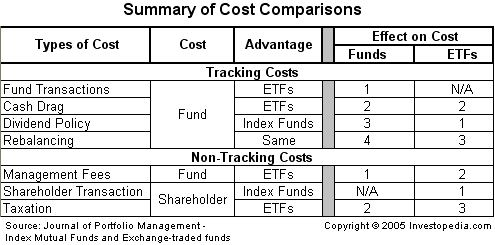ETFs v Funds Quantifying the Differences
Post on: 11 Май, 2015 No Comment

ETFs vs. Index Funds: Quantifying the Differences 5.00 / 5 (100.00%) 1 vote
For many beginning investors, it can often be difficult to figure out where the right investments lie and what types of commodities will be able to net the most profit in the long run. Many traders do not know about the importance of maintaining a diverse portfolio, one that can allow them to benefit from a wider variety of different investing opportunities. In order to make the most of any investment, many professionals in the field will recommend for individuals to look into different funds, such as ETFs(Exchange-traded fund) and index funds. As such, the decision will often be divided between these two assets. ETFs vs. index funds: quantifying the differences, can be a very important part of making a more informed decision especially if you are planning ahead to work with an asset that will suit your level of trading comfort.
Most index mutual funds remain the most popular choice for a vast majority of retail index investors when comparing the costs. However, more passive institutional investors and traders who are active in their fields may find that they will work better with the qualitative factors that are commonly found in exchange traded funds. While there has not been a great deal of attention paid to differences, many investors still have their own reasons for working with one type instead of another.
For the most part, passive institutional investors have the opportunity to use ETFs because they are more flexible by nature. Active traders, in addition to working with hedge funds, will purchase ETFs because of how easy they are to trade, and how they Still, passive institutional investors have been using ETFs because of their flexible nature. Active traders usually purchase ETFs because they are much easier to trade, and behave like stocks when they are actively moved on the market.
For the most part, rebalancing due to the net redemption of index mutual funds will typically create explicit costs based on commissions, and implicit ones that are based on underlying trades. ETFs are typically made with a much more innate design that removes the difficulties inherent with such costs. Additionally, index funds will incur costs when holding cash in order to deal with their daily net redemptions. The vast majority of ETFs do not do this because of how easy to maintain their redemption process is.
ETFs vs. index funds: quantifying the differences, can be importance because ETFs are not usually responsible for the accounting of the funds. They have a much lower cost of management when compared to index funds. Index mutual funds will also need to sell securities, which can end up triggering more taxable events. While ETFs do not sell securities, they may also reduce capital gains by transferring their securities with the unrealized gains during the redemption process. Traders are encouraged to speak with tax advisors to make the right decision for their needs.














